Old habits die hard, new ones require nurturing
It is generally accepted that high performers in all fields do better when they have a coach. In sport this almost goes without saying. Coaching results in improved performance because it addresses the issue of objectivity and subjectivity. By definition, none of us are able to be objective about our own situation. Our emotions, feelings and fears all cause us to view ourselves, and our world, through a subjective filter that can impede our actions.
Coaching allows the coachee to talk through their challenges with someone who is not part of the issue or the outcome. An effective coach will challenge, reflect and focus their coachee to generate clarity and a much higher level of objectivity. As a result, the coachee becomes more focused on their goals and more able to take the actions required to achieve those goals.

Lets get started!
- Coaching senior managers and owners
- Coaching individuals with high value/potential
- Coaching to put GoodBoss development into practice


Coaching senior managers and business owners
It can be lonely at the top so senior managers and business owners can get quite isolated. They face decisions that impact the lives of many people and can feel unable to share their thinking and concerns inside the organisation. Their own bosses or stakeholders have their own interests, and who wants to tell your boss you’re not sure what the best option is?
Remember, leaders are people too. Many decisions they face bring personal consequences for them as well. And they have their families and their own career interests to look after as well.
The coach provides a safe opportunity to explore conflicting options and ideas, challenge assumptions and clarify priorities. The coach is on your side, but not in your way. His/her interest is your success and helping you make the right decisions for you.

Coaching individuals with high value/potential
Your people with high current or potential value for the organisation will likely already have many of the skills and abilities they need. When their progress or ability to leverage these skills becomes limiting, the question becomes how to best assist and encourage their growth. Often at this stage of their careers, group training is either unsuitable or not available. One option is a personalised programme of development, tailored to their specific needs and challenges. This is where Coaching come into play.
Some of the reasons our clients provide coaching support for their people:
- Accelerating growth
- Taking the rough edges off
- Guiding development for management and leadership roles
- Keeping them on track – accountability
- Rewarding performance or potential


Coaching to put GoodBoss development into practice
Our GoodBoss development workshops are designed to engage your people’s desire to change and to help them find their reasons for change. They take your people down the dual pathways of knowing and doing.
However the doing bit is often easier said than done, and old habits die hard and new ones need nurturing.
Our application coaching helps your people turn new ideas and approaches into habits. Usually it’s a short term process over 4-8 weeks, but the small additional investment pays great dividends as your people build habits that help them align their behaviour to the organisations strategy.
What our clients say

The regular conversations that I have with my coach help me to realise what I am capable of if I apply structure, focus and control. They help me to gain a better perspective and keep me accountable for what I need to do to deliver on our strategy. He genuinely listens and this sets him apart.
Nick Cairns | CEO Pegasus Engineering Ltd
Harry recommended a no-obligations meet and greet so that we would both be sure we were a good fit at the start. This fit has been a key to the success of our coaching relationship.
Rob Rush | Principal, Clearview Primary
Leadership can be a lonely place where you are always giving. The coaching sessions give me the time to focus on me and the space to fill my bucket.
Rob Rush | Principal, Clearview Primary
Their skills and knowledge in people leadership and management have helped to stretch me and to grow my capacity as a leader of people.
Rob Rush | Principal, Clearview Primary
As a coach, Harry brings a balance of theory and pragmatism that provides me with invaluable support to focus on the right direction for my business and to work on both my strengths and weaknesses. His extensive knowledge of business and sales means that he understands the field that I work in to be able to coach me effectively.
Geoff Dunham | Agricultural Business Consultant, Dunham Consulting
I spend time after our one on one conversations reflecting on how I could do things differently. Through our coaching sessions – I am gaining a conscious awareness of what I am doing in the workplace.
Ross Smith | General Manager, Operations, Blue Sky Pastures

